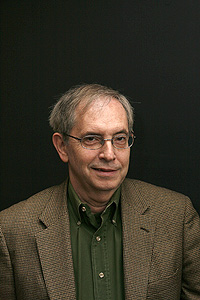Frederick de Armas, Andrew W. Mellon Professor in the Humanities, Chair of Romance Languages & Literatures
By Josh Schonwaldjschonwa@uchicago.edu
News Office
 Frederick de Armas | |
Frederick de Armas, the Andrew W. Mellon Professor in the Humanities and Chair of Romance Languages & Literatures, is a leading scholar of the literature of the Spanish Golden Age, yet when he talks about his graduate seminars, he asks, “Who is the student?”
“I am always learning things from them. I share my latest approaches with them; they respond to my arguments,” de Armas said. “They give me ideas. I get incredible feedback from them.”
De Armas eschews the high-status authority of a conventional teacher; he doesn’t believe in arbitrating whether an idea is right or wrong.
You could call his approach the “glass is half-full” school of pedagogy.
“I like to try to find something positive in an idea,” he said. “What do you achieve by destroying someone’s argument? My goal is to find something positive in what they have to say because I want to encourage my students to be creative, to explore their ideas.”
De Armas’ thinking about graduate education was strongly influenced by his experience as a graduate student of William C. McCrary at the University of North Carolina.
“Not only was it his intellectual abilities, and not only was it the way he conveyed his ideas,” de Armas said of McCreary. “It was also the way he cultivated an atmosphere—it was an open place to exchange and work on ideas.”
De Armas, whose two most recent books are Ekphrasis in the Age of Cervantes and Quixotic Frescoes: Cervantes and Italian Renaissance Art, said he does not have a wildly different approach for graduate and undergraduate classes.
“It’s just a different emphasis,” he said. “And a different conversation. Graduate students are interested in how to publish, what are the latest theories that are important to the field.”
With graduate students, in particular, De Armas said, what happens outside of the classroom, even after a Ph.D. is granted, is especially important.
De Armas regularly updates his former graduate students via e-mail. “I want them to see where some have found jobs, to know about what they’ve published, to know about important conferences in the field, early-modern Spanish literature.” This is important, de Armas said, “because they need to know their field. They are part of a community of scholars.”
If there is one consistency in his teaching approach, he said, it is the basic maxim: “Always look at the text first.” He shares this belief with colleague Thomas Pavel, the Gordon J. Laird Distinguished Service Professor in Romance Languages & Literatures. The two taught a course last winter on Don Quixote and its links to Renaissance art.
“I don’t want my students to get lost in theories,” de Armas said, “I want them to get lost in the text. Theories come out of the text. They got into this because they love literature, not because of theories.”
De Armas likes to teach classes that coincide with his current research interests. Next winter, he has a research leave to work on one of two forthcoming projects: The first explores the role of art objects in theatre; the other investigates the influence of Arabic astrology on early-modern Spanish literature.
For his second project, he already has a companion class in mind. “Perhaps I could collaborate with my colleague, Armando Maggi (Professor in Romance Languages & Literatures and the College), who studies Renaissance magic.”
![[Chronicle]](/images/sidebar_header_oct06.gif)